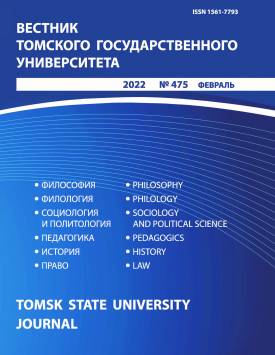Pardons in the Russian Federation: Innovations of 2020 and their impact on the expansion of the use of pardons
In the past ten years, the use of pardoning convicted persons by the President of the Russian Federation has sharply decreased, which causes criticism from representatives of the media and human rights organizations. The state authorities respond to this criticism by constantly improving the procedural rules for considering the applications of convicted persons for clemency. However, this does not lead to an increase in applying pardons. In 2020, the President of the Russian Federation again changed the procedural rules for considering applications for clemency. Thus, a new regulation on the procedure for considering petitions for clemency in the Russian Federation was adopted. This article analyzes the new regulation of this procedure, its advantages and disadvantages. The possibility of the impact of the new regulation of the pardon procedure on the expansion of the use of pardoning is evaluated. Based on the analysis, the author infers that the adopted normative legal acts will not lead to the expansion of the use of pardoning. To solve this problem based on the analysis of law enforcement practice, it is necessary to exclude the underestimation of such a form of pardon as a reduction of the imposed sentence. The author also substantiates the position on a more active use of pardons to convicts who have committed socially useful acts in the form of extinguishing fires, eliminating the consequences of natural disasters, etc. As a conclusion, the author states that repeated and not very successful attempts to improve the normative regulation of the use of pardons, together with its “fading” use, revive the controversy of the early twenty-first century about the need to develop and adopt a federal law on pardons. A draft law developed by scientists with the participation of the author of this article and published in the journal Zakon [Law] in 2002 can be taken as the basis of the federal law. This project can be finalized with the involvement of representatives of the President of the Russian Federation, scientists, legislators, human rights defenders, as well as the judicial community. Such a transparent revision and adoption of the federal law will help to avoid the current shortcomings in the normative regulation of the use of pardons, to reach an optimal consensus of political forces and the public in the practice of applying pardons in modern conditions. All this will guarantee the rights of convicted persons to have their petitions for clemency considered and will activate the use of this institution, which testifies to the manifestation of humanism to persons serving criminal sentences.
Keywords
pardon, convicted persons, criminal punishment, federal law on pardonAuthors
| Name | Organization | |
| Seliverstov Viacheslav I. | Lomonosov Moscow State University; Moscow State Linguistic University | vis_home@list.ru |
References

Pardons in the Russian Federation: Innovations of 2020 and their impact on the expansion of the use of pardons | Vestnik Tomskogo gosudarstvennogo universiteta – Tomsk State University Journal. 2022. № 475. DOI: 10.17223/15617793/475/27
